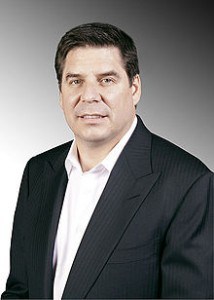
Out: Hesse
Sprint CEO Dan Hesse has left the building. He won’t be the last.
Hesse was appointed to lead Sprint in December 2007 after the catastrophic mess created when Sprint and Nextel merged. Now he’s gone because of his catastrophic failure to convince regulators a merger with T-Mobile USA made sense.
Brightstar Corporation CEO Marcelo Claure, appointed to Sprint’s board of directors by Softbank Mobile CEO Masayoshi Son earlier this year, is now in charge, and his commitment to save Sprint isn’t much different from what Hesse promised almost seven years earlier.
“The strategy is simple,” Mr. Claure said in an interview Monday. “We have to get back in the game.”
On a company-wide town hall call on Thursday, Claure outlined his three priorities: cut prices, improve the network, and decrease operational costs. Priority number one, price reductions, which have already started.

In: Claure
Claure blasted Sprint’s current pricing models, which he admitted were out of line considering how bad Sprint’s network is these days. He also trashed Sprint’s upgrade efforts, calling the “rip and replace” method of upgrading individual cell sites too slow, admitted social media networks were loaded with negative comments about Sprint’s performance, and that absolutely nobody understood the company’s most recent marketing attempt – a talking hamster selling Sprint’s Framily plan.
“We’re going to change our plans to make sure they are simple and attractive and make sure every customer in America thinks twice about signing up to a competitor,” he said. “When you have a great network, you don’t have to compete on price. When your network is behind, unfortunately you have to compete on value and price.”
Sprint’s network isn’t just behind, it’s downright prehistoric in places. Its 3G network borders on unusable in large cities, WiMAX is on life support, and Sprint’s 4G LTE network expansion is taking so long, by the time it is finished, LTE might be considered passé. Hesse had avoided a more aggressive timetable to protect Sprint’s share price from the precipitous drop that would come from an upgrade spending spree.
Those days are over.
Claure warned the changes for Sprint would not just include price cuts and upgrades. It will also mean major job cuts, although Claure would not specify exactly how many Sprint employees were headed for the unemployment office. Unlimited data may also be headed for the door – Claure would not commit to retaining the unlimited use wireless data plans Sprint has been known for under Hesse’s leadership. Kansas City officials are also worried Sprint’s new executive team wants to move the company headquarters west, likely to California.
 Masayoshi Son and Claure both agree that U.S. regulators were no fans of Sprint either — sending clear and unambiguous warnings that continued efforts to merge Sprint with T-Mobile USA were futile. So a proposed merger between the two companies is off. T-Mobile USA CEO John Legere wasted no time piling on, advising Sprint customers in tweets to #SprintLikeHell to another wireless carrier (preferably his).
Masayoshi Son and Claure both agree that U.S. regulators were no fans of Sprint either — sending clear and unambiguous warnings that continued efforts to merge Sprint with T-Mobile USA were futile. So a proposed merger between the two companies is off. T-Mobile USA CEO John Legere wasted no time piling on, advising Sprint customers in tweets to #SprintLikeHell to another wireless carrier (preferably his).
Some predictable grumbling from Wall Street has also been heard over Claure’s plans to disrupt the comfortable profits earned by American wireless companies.
“Expect capital spending to rise,” says analyst firm Moffett Nathanson in a research note. “They will also have to cut their service prices, which are simply are too high relative to competitors.”
With a dramatic cut in prices, Sprint’s financials will look “ugly” in the coming quarters.
[flv]http://www.phillipdampier.com/video/Bloomberg Here is Why Sprint Stopped Talks With T-Mobile 8-6-14.flv[/flv]
Sprint ended talks to acquire T-Mobile US a person with knowledge of the matter said, as regulatory concerns outweighed the potential benefits of combining the third- and fourth-largest U.S. wireless carries. Bloomberg’s Alex Sherman reports on “Market Makers.” (4:07)
[flv]http://www.phillipdampier.com/video/Bloomberg Sprint Faces Tough Road Running Business 8-6-14.flv[/flv]
Craig Moffett, founder of MoffettNathanson LLC, talks about reports of Sprint Corp.’s decision to end talks to acquire T-Mobile US Inc. due to regulatory concerns. Moffett speaks with Tom Keene and Brendan Greeley on Bloomberg Television’s “Surveillance.” (3:25)
[flv]http://www.phillipdampier.com/video/Bloomberg Sprints Dropped T-Mobile Bid Adds Options Ergen 8-7-14.flv[/flv]
Dish Network Chairman Charlie Ergen said Sprint’s decision to drop its bid for T-Mobile US has opened up more options for his satellite-TV carrier as it looks for ways to expand into the wireless business. Alex Sherman reports on “In The Loop.” (4:01)
[flv]http://www.phillipdampier.com/video/Bloomberg Sprint CEO Right Man for Right Company 8-11-14.flv[/flv]
Patterson Advisory Group Chairman and CEO Jim Patterson and Bloomberg Intelligence Telecom Analyst John Butler discuss challenges facing Sprint’s new CEO Marcelo Claure. Patterson and Butler speak on “In The Loop.” (5:47)
[flv]http://www.phillipdampier.com/video/Bloomberg Is Sprints New CEO up to the Challenges He Faces 8-11-14.flv[/flv]
Bill Ho, principal analyst at 556 Ventures, and Bloomberg Intelligence’s John Butler discuss expectations for Sprint’s new Chief Executive Officer Marcello Claure and look at the challenges he faces as the head of the nation’s number three wireless company. They speak on “Market Makers.” (6:56)


 Subscribe
Subscribe


